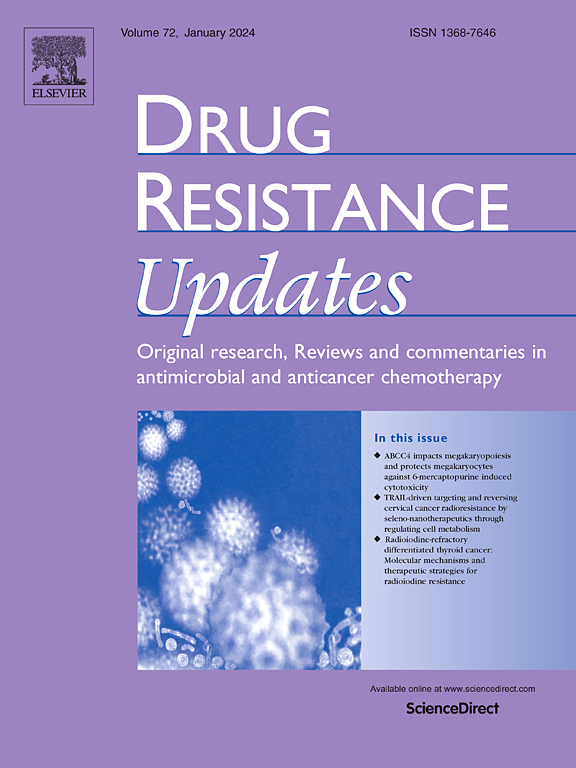Wip1 phosphatase activator QGC-8–52 specifically sensitizes p53-negative cancer cells to chemotherapy while protecting normal cells
IF 15.8
1区 医学
Q1 PHARMACOLOGY & PHARMACY
引用次数: 0
Abstract
PP2C serine-threonine phosphatase Wip1 plays an important role in normal tissue homeostasis, stress signaling and pathogenesis of various human diseases. It is an attractive drug target for cancer treatment and inhibition of its expression or activity constitute a novel therapeutic intervention strategy to prevent the development of various cancers. However, previous strategies for Wip1 suppression may be ineffective in cancers lacking p53. Here, we have characterized the activity of a novel Wip1 phosphatase activator, QGC-8–52, in preclinical models of breast malignancies. QGC-8–52 significantly sensitizes the cancer cell lines with p53 deletion to chemotherapeutic agents. This effect was mediated by the Wip1-FOXO3a interaction and subsequent dephosphorylation of Thr487 that resulted, in response to anticancer treatment, in enhancing the transcription activity of FOXO3a on the proapoptotic TRAIL gene. The sensitizing effect of Wip1 activation on chemotherapeutic drugs only targeted cancer cells lacking p53. The activation of Wip1 in normal cells provided protection from anticancer drug-induced apoptosis by reducing the strength of upstream signaling to p53. Therefore, during the treatment of anticancer drugs, the activated Wip1 phosphatase boosts the apoptosis of p53-negative tumors and protects normal tissues. Our findings may represent an effective and safe therapeutic strategy for cancers with p53 deletion.
Wip1磷酸酶激活剂QGC-8-52特异性地使p53阴性癌细胞对化疗增敏,同时保护正常细胞。
PP2C丝氨酸-苏氨酸磷酸酶Wip1在正常组织稳态、应激信号传导和多种人类疾病的发病机制中发挥重要作用。它是一种有吸引力的癌症治疗药物靶点,抑制其表达或活性是预防各种癌症发展的一种新的治疗干预策略。然而,先前的Wip1抑制策略在缺乏p53的癌症中可能无效。在这里,我们描述了一种新的Wip1磷酸酶激活剂QGC-8-52在乳腺恶性肿瘤临床前模型中的活性。QGC-8-52对p53缺失的癌细胞对化疗药物有明显的增敏作用。这种作用是由Wip1-FOXO3a相互作用和随后Thr487的去磷酸化介导的,在抗癌治疗的反应中,FOXO3a对促凋亡TRAIL基因的转录活性增强。Wip1激活对化疗药物的增敏作用仅针对缺乏p53的癌细胞。在正常细胞中,Wip1的激活通过降低p53上游信号的强度,为抗癌药物诱导的细胞凋亡提供保护。因此,在抗癌药物治疗过程中,激活的Wip1磷酸酶促进p53阴性肿瘤的凋亡,保护正常组织。我们的研究结果可能为p53缺失的癌症提供了一种有效和安全的治疗策略。
本文章由计算机程序翻译,如有差异,请以英文原文为准。
求助全文
约1分钟内获得全文
求助全文
来源期刊

Drug Resistance Updates
医学-药学
CiteScore
26.20
自引率
11.90%
发文量
32
审稿时长
29 days
期刊介绍:
Drug Resistance Updates serves as a platform for publishing original research, commentary, and expert reviews on significant advancements in drug resistance related to infectious diseases and cancer. It encompasses diverse disciplines such as molecular biology, biochemistry, cell biology, pharmacology, microbiology, preclinical therapeutics, oncology, and clinical medicine. The journal addresses both basic research and clinical aspects of drug resistance, providing insights into novel drugs and strategies to overcome resistance. Original research articles are welcomed, and review articles are authored by leaders in the field by invitation.
Articles are written by leaders in the field, in response to an invitation from the Editors, and are peer-reviewed prior to publication. Articles are clear, readable, and up-to-date, suitable for a multidisciplinary readership and include schematic diagrams and other illustrations conveying the major points of the article. The goal is to highlight recent areas of growth and put them in perspective.
*Expert reviews in clinical and basic drug resistance research in oncology and infectious disease
*Describes emerging technologies and therapies, particularly those that overcome drug resistance
*Emphasises common themes in microbial and cancer research
 求助内容:
求助内容: 应助结果提醒方式:
应助结果提醒方式:


